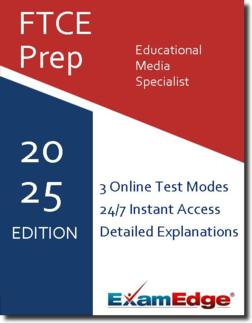FTCE Educational Media Specialist (010) Practice Tests & Test Prep by Exam Edge - Topics
Based on 22 Reviews
- Real Exam Simulation: Timed questions and matching content build comfort for your FTCE Educational Media Specialist test day.
- Instant, 24/7 Access: Web-based FTCE Educational Media Specialist K-12 practice exams with no software needed.
- Clear Explanations: Step-by-step answers and explanations for your FTCE exam to strengthen understanding.
- Boosted Confidence: Reduces anxiety and improves test-taking skills to ace your FTCE Educational Media Specialist K-12 (010).

Understanding the exact breakdown of the FTCE Educational Media Specialist K-12 test will help you know what to expect and how to most effectively prepare. The FTCE Educational Media Specialist K-12 has 100 multiple-choice questions The exam will be broken down into the sections below:
| FTCE Educational Media Specialist K-12 Exam Blueprint | ||
|---|---|---|
| Domain Name | % | Number of Questions |
| Knowledge of professional organizations, resources, and national and state guidelines and standards for the school library media specialist |
3% | 3 |
| Knowledge of teaching and learning principles of the school library media specialist | 3% | 3 |
| Knowledge of the instructional partner responsibilities of the school library media specialist | 2% | 2 |
| Knowledge of teaching methods for implementing multiple literacies | 8% | 8 |
| Knowledge of methods for teaching and assisting the school learning community in design and production of various types of media | 3% | 3 |
| Knowledge of design and delivery of staff development | 3% | 3 |
| Knowledge of the information specialist responsibilities of the school library media specialist | 7% | 7 |
| Knowledge of resources in all formats for the learning community | 4% | 4 |
| Knowledge of the foundations, designing, planning, and development of a school library media program | 5% | 5 |
| Knowledge of procedures to assess and evaluate the effectiveness of a school library media program | 4% | 4 |
| Comprehension of skills required to plan, prepare, advocate, and administer a budget | 3% | 3 |
| Knowledge of supervision of staff and volunteers for the school library media program | 2% | 2 |
| Knowledge of policies and procedures used in the school library media program | 3% | 3 |
| Knowledge of methods for creating an active learning environment | 3% | 3 |
| Knowledge of methods for advocating an effective school library media program | 4% | 4 |
| Knowledge of policies and procedures for collection development | 7% | 7 |
| Knowledge of policies and processes for managing, cataloging, organizing, circulating, and maintaining resources |
7% | 7 |
| Comprehension of leadership and interpersonal skills for the school library media specialist |
3% | 3 |
| Knowledge of state and national legislation and their effects on the school library media program | 2% | 2 |
| Knowledge of current professional trends and issues of the school library media program | 3% | 3 |
| Knowledge of research related to the school library media program | 4% | 4 |
| Knowledge of professional ethics for the school library media specialist | 5% | 5 |
| Knowledge of methods for providing equity, diversity, and global perspectives in the school library media program |
3% | 3 |
| Knowledge of methods for integrating technology into the instructional program | 5% | 5 |
| Knowledge of reading research and strategies | 4% | 4 |


